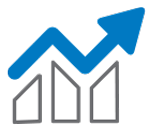
How can Canadian investors gain targeted exposures and the potential for long-term outperformance? Smart beta, or factor-based investing. It emphasizes specific factors, such as volatility or dividends.
These days, one of the most important factors is quality. “It has flown under the radar, but investors are increasingly seeing the benefits,” says Chris Heakes, Director and Portfolio Manager with BMO Global Asset Management.
BMO ETFs include a quality suite (U.S., Europe, and global) that’s a key pillar in portfolio construction. Here are four reasons why quality pays.
 The companies score where it counts most.
The companies score where it counts most.
BMO ETFs select companies based on three equally weighted metrics: profitability, low leverage, and stable earnings. Together, these three metrics provide an accurate quality assessment. That’s because the best companies in the world are generally more profitable and have stronger balance sheets than their peers. “This combination has proven to add value, in back tests and live performance,” says Heakes.
 Quality companies transcend market conditions.
Quality companies transcend market conditions.
The firms that meet BMO’s quality metrics have historically outperformed the broad market with lower volatility. They do well in positive markets and in times of contraction. Investors maintain equity exposure, and are positioned defensively for the next recession. We’re 10 years out from the last market correction, and while Heakes says we’re likely to still see growth, these quality companies can weather a storm.
 Investors get true market-leading companies.
Investors get true market-leading companies.
Quality-based investing offers access to long-term industry leaders within highly diversified portfolios. Says Heakes, “It’s about identifying companies with sustainable competitive advantages.”
 You boost the odds of higher returns and lower risks.
You boost the odds of higher returns and lower risks.
Research shows that equity investing with a quality focus earns a premium while reducing risk over longer periods (relative to the market). “You’re investing in companies that are the best of the best,” says Heakes. “That’s going to give you the benefit over time.”
Look for timely ETF advice from BMO Asset Management in the April, May, September and October issues of Investment Executive and Finance et investissement.

Chris Heakes,
Director and Portfolio Manager, BMO Global Asset Management

Commissions, management fees and expenses all may be associated with investments in exchange traded funds. Please read the ETF Facts or prospectus before investing. Exchange traded funds are not guaranteed, their values change frequently and past performance may not be repeated.
For a summary of the risks of an investment in the BMO ETFs, please see the specific risks set out in the prospectus. BMO ETFs and ETF series trade like stocks, fluctuate in market value and may trade at a discount to their net asset value, which may increase the risk of loss. Distributions are not guaranteed and are subject to change and/or elimination.
BMO ETFs are managed by BMO Asset Management Inc., which is an investment fund manager and a portfolio manager, and a separate legal entity from Bank of Montreal.
®/™Registered trade-marks/trade-mark of Bank of Montreal, used under licence.